Stay in the know on all smart updates of your favorite topics.
People get more connected and technology becomes part of our daily life. Between 2014 and 2015 there was a 27% growth of internet traffic in Amsterdam. Eleven out of fifteen Trans-Atlantic data cables are connected with or go through Amsterdam and the AMS-IX is the second largest internet exchange point in the world. In 2016 Amsterdam was ranked second in the European Digital City Index. Do you work on a smarter city? Share your technologies here!
Agenda Digitale Stad gelanceerd!
Vijfentwintig jaar geleden werd het internet in Amsterdam voor veel mensen vrij toegankelijk. Met de eerste Agenda Digitale Stad zal nu de volgende stap gezet worden. De aankomende jaren zal ingezet worden op een vrije, inclusieve en creatieve digitale stad.
Technologie moet weer menselijk gemaakt worden, samen met Amsterdammers, experts en andere steden gaat de gemeente verschillende acties, onderzoeken en experimenten uitvoeren.
Check de belangrijkste thema's en de Agenda Digitale Stad via de link.
5G challenge
Schrijf je in voor de 5G challenge en kom op donderdag 4 april jouw innovatieve idee presenteren tegenover een smart city jury bestaande uit de Gemeente Amsterdam, Johan Cruijff ArenA en KPN .
MORGENLAND: The Dutch Approach — Changing the Narrative on Climate Change
Strawberry Fields creative agency has brought addressing climate change to light in a new way with an animated short film, Morgenland (Morrowland). The film takes viewers on a 12-minute positive, inspiring journey about what measures the Dutch can take to have a positive impact on reaching the European Commission’s “Climate Neutral by 2050” goal.
Contrary to many alarmist messages, Morgenland is enjoyable, understandable, and relatable to everyone. It tells a hopeful story while asking every citizen what they can personally do to help. Viewers are asked to make their own unique contributions to combating climate change.
Morgenland creates awareness and lays out the urgency of acting on climate change, however, this is done in a positive manner by spelling out what specific impacts energy transition will have on aspect of our daily lives. The film was strategically produced in an animated folk story style — something that is deeply ingrained in the Dutch culture.
Key points about reaching the 2050 goal are:
- It is necessary to reduce our energy consumption by two-thirds.
- Remaining energy usage has to be produced from sustainable sources such as wind and solar.
- It is important to close down coal-fired power plants immediately.
- Energy transition will engender innovation, and increase employment and export opportunities.
Above all, the film makes it clear that every inhabitant of this country has a role to play in the energy transition. The film concludes with a call to action: "How else can we work on our country of tomorrow?"
Strawberry Fields specializes in sustainable communication. The film and accompanying lessons for every type of education, from primary school to university, are freely accessible in Dutch and English at www.morgenlandfilm.nl.
Een Amsterdamse Energietransitie Situatieschets
The energy transition in Amsterdam is underway. In an attempt to meet national climate related targets, the municipality has set itself a series of targets addressing carbon dioxide emission reduction and the need for fundamental changes in all sectors of society. In order for the transition to be a success, citizens of the metropolitan region must be engaged in the process and are encouraged to contribute by means of ‘bottom-up energy initiatives’. The municipality seeks to stimulate initiatives by providing subsidies and non-financial aid. A variety of obstacles do however stand in the way, preventing a meaningful contribution of these initiatives. In my upcoming blog posts I hope to understand the roles played by these initiatives by taking a closer look at how they are organised and what they need in order to be able to efficiently collaborate with stakeholders such as the municipality. Read on in Dutch.
Hi Amsterdam Smart City community,
Mijn naam is Nicholas en deze maanden loop ik stage bij Amsterdam Smart City. Ik hoop binnen de energietransitie in Amsterdam antwoord te vinden op twee vraagstukken. Ten eerste wil ik beter begrijpen hoe lokale energie-initiatieven (bottom up/bewonersinitiatieven) zich organiseren en hoe ze tot stand zijn gekomen, en ten tweede, wat deze initiatieven nodig hebben om als samenwerkingspartner te kunnen opereren met grote partijen zoals de gemeente. Ik ga jullie meenemen in mijn onderzoek door middel van een reeks van blogposts. Om mijn onderzoek context te geven zal ik in deze post focussen op een situatieschets, gebaseerd op recente ontwikkelingen op het gebied van energietransitie in de stad Amsterdam. Uiteraard ben ik ook benieuwd naar jullie input!
DE ENERGIETRANSITIE IN AMSTERDAM: Om de doelen van de Parijs klimaatconferentie te halen heeft de Nederlandse regering besloten om van het aardgas af te gaan. Dit is een transitie naar een energieneutraal en klimaatvriendelijke samenleving. Gemeenten en andere overheidsinstanties dragen bij aan dit proces door middel van het stellen van specifieke en lokale doelen. Ook in de Gemeente Amsterdam moet er in de komende jaren ontzettend veel gebeuren. Relevant hiervoor zijn de ‘2040 Energy Strategy’, de ‘Routekaart Amsterdam Klimaatneutraal 2050’ en het ‘2018 Amsterdam Coalitieakkoord’ waarin de stad onder andere haar ambitie toont om CO2 uitstoot aanzienlijk te verminderen.
In de ‘2040 Energy Strategy’ zijn drie thema's gepresenteerd, in lijn met de trias energetica. Door een combinatie van energiebesparing, het maximale gebruik van duurzame energiebronnen, en het efficiënte gebruik van fossiele energiebronnen hoopt de gemeente een duurzame toekomst te kunnen garanderen. Onder deze transitiepaden zijn vier sectoren geïdentificeerd waar verandering moet worden geïmplementeerd: gebouwen, haven en industrie, transport en duurzame energie. Soortgelijke ambities zijn vermeld in het Coalitieakkoord van de gemeente en in de ‘Routekaart Amsterdam Klimaatneutraal 2050’. Nieuwbouwprojecten zullen energieneutraal moeten worden gebouwd, daken moeten goed worden benut door de installatie van zonnepanelen, en de kolencentrale aan de Hemweg, zal moeten worden gesloten.
EEN CENTRALE ROL VOOR BEWONERS IN DE ENERGIETRANSITIE: De energietransitie is naar verwachting zo ingrijpend, dat de sociale component in de transitie belangrijker wordt. De impact voor de ‘gewone’ Amsterdammer reikt tot achter de voordeuren dus is het noodzakelijk om mensen zorgvuldig te betrekken, zoals ook vermeld in het Coalitieakkoord’. Lokale energie-initiatieven spelen hier een belangrijke rol en zijn voor gemeenten onmisbaar om de transitie waar te kunnen maken. Anders dan via traditionele rollen als informeren of een subsidieverstrekking, zien we onder meer in Amsterdam ook een andere interactie tussen overheid en de inwoner. Vanuit zelforganisatie ontstaan er lokale initiatieven, waarbij bewoners de mogelijkheid zien om sociale cohesie en samenwerking te kweken in de gemeenschappen en buurten. De gemeente ondersteunt ook deze initiatieven in de vorm van subsidies en niet financiële activiteiten zoals informatieverstrekking. Zo kun je onder de onderwerpen ‘duurzaam en groen’ en ‘wonen en leefomgeving’ gebruik maken van een verscheidenheid aan aantrekkelijke subsidies.
Er zijn veel obstakels die de optimale bijdrage van lokale initiatieven voorkomen. Uit een onderzoek van de Nationale ombudsman blijkt dat gemeenten het lastig vinden om een balans te vinden tussen een vorm van ondersteuning en het geven van zelfstandigheid. Lokale initiatieven passen niet altijd in de bestaande kaders en regels, en er is soms bij ambtenaren onvoldoende bereidheid om hier flexibel en creatief mee om te gaan. Als een lokaal initiatief zich bekend maakt, vragen gemeenten zich nog vaak af wat zij daarmee moeten doen, meldt platform ‘HIER Opgewekt’. Hierdoor gaat de slagkracht verloren en belanden bewonersinitiatieven (of lokale, wat je wil!) vaak in gecompliceerde ambtelijke processen en lange wachtrijen voor hulp.
Door middel van mijn onderzoek en blogposts hoop ik beter te kunnen aankaarten wat lokale energie-initiatieven nodig hebben voor een goede relatie met de gemeente en om voldoende slagkracht te hebben in de energietransitie. In mijn volgende post kijk ik naar de organisatiestructuur van lokale energie-initiatieven.
Ik ben ook benieuwd naar jullie verhalen! Als bewonersinitiatief in de energietransitie, wat denken jullie dat er is nodig om beter te kunnen presteren?
Citizens Panel Amsterdam
Op 25 februari 2019 organiseren de Gemeente Amsterdam en Waag het Citizens Panel Amsterdam over de toekomst van de digitale samenleving. Discussieer mee en vorm samen een nieuwe koers voor de toekomst, de beste ideeën worden op de Mayors Summit in Brussel gepresenteerd.
In heel Europa worden citizens’ panels georganiseerd in aanloop naar de Europese verkiezingen in mei. Wat vind jij dat er op de agenda moet als het gaat om jouw data? Biedt de digitalisering nieuwe mogelijkheden of zie je vooral de keerzijden? Kom ook en praat mee!
"Is Google je beste vriend?"
Grote technologiebedrijven trekken gebruikers aan met prachtige, 'gratis' producten. Maar voor deze diensten lever je een deel van je privacy in. Hoe wenselijk is dat? Misschien willen we de gegevens delen die we genereren, of misschien niet: hoe dan ook, we willen dat graag zelf bepalen.
De gemeente vraagt zich bijvoorbeeld af hoe burgers en bedrijven hun gegevens kunnen delen, terwijl iedereen controle houdt over hun persoonlijke gegevens. Moet de overheid een rol spelen bij dit eigenaarschap over data? Hoe moeten burgers geïnformeerd worden? En hoe willen we deze data gebruiken?
Wil je meepraten over de online samenleving, over veiligheid, toegankelijkheid, eigenaarschap en privacy, en bovenal over de (on)mogelijkheden van je online 'jij'?
De toegang is gratis. Er wordt Nederlands gesproken.
Programma
Programma
19.00 Inloop
19.30 Welkom en inleiding
19.40 Gesprek met Marleen Stikker en Saskia Nijs
19.50 Introductie tot citizens panel, moderatie door Kevin de Randamie
20.00 Ronde 1: Wat speelt er allemaal?
20.30 Intermezzo
20.40 Introductie tot ronde 2
20.45 Ronde 2: Wat willen we?
21.10 Stellingen verzamelen en stemmen
21.25 Plenaire afsluiting
21.30 Borrel
Het Citizens Panel Amsterdam wordt georganiseerd door EUROCITIES, de Gemeente Amsterdam, OBA en Waag. EUROCITIES is een netwerk van grote Europese steden.
Connect with international delegations!
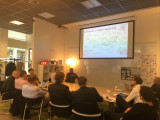
Amsterdam Smart City (ASC) receives many requests from international delegations who are interested in collaborating and exchanging experiences on smart city topics.
We are looking for experts, companies and start-ups in our community who would like to share their knowledge, expertise and services with visiting delegations. Are you interested?
**Amsterdam Smart City (ASC) receives many requests from international delegations who are interested in collaborating and exchanging experiences on smart city topics.
We are looking for experts, companies and start-ups in our community who would like to share their knowledge, expertise and services with visiting delegations.**
If you are interested, please email cornelia@amsterdamsmartcity.com with the following information:
1. Which delegation you would like to meet with;
2. A short description of your presentation, product, or service;
3. How this information will benefit the visiting delegation.
International delegations requests:
1. South-Korean Trade Mission - 19 February:
This delegation consists of seven SME’s and representatives from governmental agencies supporting innovation and entrepreneurship. They are interested in the Dutch approach to building an innovation ecosystem, how government facilitates collaboration between corporations and SME’s, and best practices related to digitalization, smart city, and other smart industry topics.
2. Honda, Japan — 26 or 27 February:
Four person delegation interested in e-mobility and smart energy; smart grid developments; utilization of data and the overall structure, organization and management of smart city projects.
3. Finland Trade — 5 March:
Roadshow for Finish companies working on the energy transition. Meeting scheduled with Alliander to discuss smart energy/smart-grid projects. There is a possibility for relevant experts and stakeholders to join he exchange.
4. Sofia Investment Agency — 7 & 8 March:
The CEO of Sofia Investment Agency will be visiting along with a delegation of 10 political and business leaders. Their areas of interest are: smart city, digital connectivity & IoT, innovation & startup ecosystem, circular city and creative industries.
5. National Defense College of Thailand — 19 March:
Interest in best practices on triple-helix cooperation and smart grid technologies which can be transferred to Bangkok.
6. Slovakia Delegation of Mobility Experts — 19 March:
This delegation consists of specialists in e-mobility, parking strategy and smart technologies in the Moravian-Silesian Region in Slovakia. They are involved with the EU project RESOLVE and are interested in best practices and innovations related to electric mobility and clean logistics projects from Amsterdam and the Metropolitan Region.
7. CFAI Thyez Applied School (France) — 4 April:
A group of 13 vocational electrical engineering students are interested in a site visit related to smart energy, power supply and/or electrical installations.
8. Leverkusen, Germany Government Officials — 9 or 22 May:
This municipal delegation is interested in best practices regarding electric, smart and sustainable mobility. All presentations and tours must be in German.
Looking back on 101 Amsterdam Smart City delegations hosted in 2018!
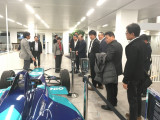
ASC receives a lot of requests from international delegation interested in exchanging experiences and exploring collaboration opportunities. In this post we look back on 101 delegations we hosted from more than 20 countries in 2018.
What kind of groups visit Amsterdam Smart City and why?
Nearly half (47%) of delegations that visit Amsterdam Smart City are governmental groups and another 23% are academic. The rest are private sector (15%), press (8%) and public-private groups (5%). Most groups visit in hopes of meeting with relevant experts and stakeholders and learning from best practices. Another reason for visiting is to connect to innovative organizations and startups and to explore possibilities for collaboration. About 25% of delegations came from South Korea where the concept of smart or “ubiquitous” city originates. Other delegations come most often from USA, Japan, Germany, Finland, Denmark, Taiwan and UK.
Here are the top 10 things delegations tell us they find most inspiring about visiting Amsterdam:
1. Innovative area development — Amsterdam has a long history of innovative area development, with the Canal Belt from the 1600’s as one of the world’s most famous master plans. This culture of innovation is thriving in Amsterdam, with districts such as Circular Buiksloterham and climate-neutral Houthavens providing inspiration and best practices for master planning new city districts or transforming post-industrial areas.
2. Smart and innovative mobility solutions – While most are aware of Amsterdam’s position as a leading cycling city, many are surprised to discover Amsterdam is also a leader in electric and shared mobility. This can be seen in the form of Tesla taxis and electric buses across the city, as well as more than 2,000 electric vehicle-charging stations installed in public space. What is often most inspiring for groups is to learn that these approaches are not at all new - Amsterdam launched its first electric car-sharing system in 1974!
3. Johan Cruijff Innovation Area – Home of Ajax football club, Johan Cruijff Arena is one of the most innovative stadiums in the world. Instead of depending on diesel, the Arena constructed a micro-grid which provides uninterrupted power supply during events. It uses second life Nissan-fuel cells which store the renewable energy generated by its PV panels. The Arena is also a testing ground for innovative mobility, digital connectivity, crowd management and fan experience projects.
4. De Ceuvel Living Lab — A former shipyard now converted into a small office park for creative companies, De Ceuvel launched Jouliette, Amsterdam’s first block chain project for energy. In collaboration with CITI-XL, De Ceuvel also makes it possible for international delegations to test their technologies. Lora-enabled smart water meters from South Korea are currently being tested on the site.
5. Circl Pavilion — The Dutch government has laid out an ambitious plan to transition to a fully circular economy by 2050. Circl, a new circular building in Amsterdam’s Zuidas district offers some insight into achieve this goal. An initiative of ABN AMRO, the pavilion showcases new circular construction methods and business models. Almost all of the materials used in creating Circl are second-hand or are easily disassembled for reuse. For many delegations, Circl inspires and stimulates discussion about the transition to a circular economy.
6. Amsterdam is an ethical and responsible digital city — Digital connectivity and digital transformation are “buzz-terms” of interest for most visiting delegations. Many groups are initially disappointed to find out that Amsterdam is not the most advanced city when it comes to connected sensors, cameras and IoT devices. Instead, the focus is on the principles and values necessary to become an ethical and responsible digital city. This is best illustrated in the ‘Tada – data disclosed’ manifesto where six principles were spelled out for ensuring Amsterdam’s transition to a digital society which benefits everyone. Amsterdam also teamed up with Barcelona and New York to launch the Cities Coalition for Digital Rights, laying out five key points regarding universal Internet access; privacy, data protections and security; transparency and accountability; participatory democracy; and open and ethical digital standards. Other cities are welcome to join!
7. Vibrant startups and innovation ecosystems — Visits to hubs such as B Amsterdam, TQ and Startup Village make it possible to experience Amsterdam’s thriving startup ecosystem first hand. But, what’s most inspiring for professionals working with startups on a daily basis is Amsterdam’s approach to inviting startups to help solve urban challenges through the city’s Startup in Residence program. Now in its fourth year, the program has expanded to other Dutch municipalities and ministries.
8. Amsterdam’s approach to open engagement and dialogue — Among the highlights for many delegations is the opportunity to join open events like those hosted by Pakhuis de Zwijger, Waag Society or DataLab, where various stakeholders come together to discuss and co-create solutions to urban challenges. All of this in-person interaction is matched with the opportunity to engage online via various community engagement, participatory budgeting, and crowd funding platforms such as Voor je Buurt, West Begroot, Gebied Online, Argu and Amsterdam Smart City’s very own platform of over 6,000 members!
9. Abundance of bottom-up and community initiatives – Amsterdam’s rich ecosystem of bottom-up and community lead initiatives is according to many experts the very reason why Amsterdam was named Europe’s Innovation Capital (iCapital) in 2016. Delegations are often inspired by these initiatives, be it neighbourhood lead worm-composting or off-grid urban-farm cafes. The Amsterdammers, Make your City contest and the We Make The City innovation festival are great examples of Amsterdam's commitment to further strengthening bottom-up initiatives.
10. Innovating through public-private-partnerships (PPP’s) – More than any specific project or technology, delegations are most impressed by Amsterdam’s approach to innovation through public-private partnership and community platforms. As neither a governmental organization nor a company, Amsterdam Smart City brings together public private partners and stakeholders motivated to work on the city of the future. Governmental delegations especially divulge that they struggle to find private sector partners who are committed to collaborating, and they are curious about Amsterdam's "secrets" to working in this way.
***Are you involved in an innovative project in Amsterdam or the metropolitan Area which you would like to showcase to national and international delegations in 2019?
Share your ideas and suggestions in the comments section below or send an email to cornelia@amsterdamsmartcity.com.***
How to involve citizens in energy transition
Recently, the city of Amsterdam widely distributed a booklet called 'Amsterdam klimaatneutraal 2050'. It is the starting point of a citywide consultation process. In this short blog post (in Dutch), I explain why this booklet might feed feelings of uncertainty in the first place instead of involving citizens in the transition process.
How to align smart city policies with social and environmental sustainability goals

The Charter for a Humane City has been written with Amsterdam in mind. 'Smart Amsterdam' has never been focused on narrow technological objectives.
If you like, you can download the Charter for a Humane City here (English version):
https://www.dropbox.com/s/ji37e4paxjnu60z/2018%2011%2025%20Stedelijke%20uitdagingen%20Charter%20Eng.docx?dl=0
De Nederlandse versie: Handvest voor een humane stad kun je hier downloaden: https://www.dropbox.com/s/mgy4740q03k9ksf/2018%2011%2025%20Stedelijke%20uitdagingen%20Charter.pdf?dl=0
How much sustainable electricity can we produce?
The recent Energy agreement is too much focused on the reduction of CO2 (very important indeed). It pays too little attention to the possible sources of energy, available in the future. In this post (in Dutch), I make a couple of calculations that indicate the toughness of the job producing sufficient electricity in 2050 to attain the 1,5%-target by deploying sun and wind energy only. I would be very happy if somebody would verify these calculations.
The Things Network: impact prijsvraag digitale economie
In 2016 hebben de overheden in de Metropoolregio Amsterdam in samenwerking met de Amsterdam Economic Board een prijsvraag digitale economie uitgezet. The Things Network was één van de winnaars die met een bedrag van € 500.000 aan de slag ging om het eerste – open en gratis te gebruiken – Internet of Things data netwerk ter wereld te ontwikkelen. Nu, twee en een half jaar later, kijken we wat er van deze ambitie is gerealiseerd en welke lessen zijn geleerd.
From hype to adoption: Blockchain meetup #1
How do we turn the Amsterdam Metropolitan Area into a Blockchain hub? That is what the Amsterdam Economic Board is researching together with the City of Amsterdam and StartupAmsterdam through a series of 6 meetups. Because Blockchain could be an important part of the solutions for the six urban challenges of our metropolis. The first meeting tried to find an answer to the question: “How do we ensure more adoption of Blockchain technology now that the hype seems to be over?
Read the full article by clicking the link
Hydrogen: no technical considerations but geopolitics prevent its future use
In my newest blog post, I elaborate on the use of hydrogen. Hydrogen has many advantages (easy storage). However, to produce it, a lot of electricity is needed which can better be deployed directly. The import of hydrogen from countries where the production of electricity is much cheaper is a feasible solution. But as the countries most eager to export hydrogen are the Gulf states, many doubts are arousing.....
A slightly different version in Dutch can be found here: https://hmjvandenbosch.com/2018/12/17/waterstof-vooral-geopolitiek-bepaalt-toekomstige-rol%EF%BB%BF/
Mayor Franc Weerwind about the Digital Transformation of Cities
On December 4, the Mayors of over 40 cities were invited at the Committee of the Regions in Brussels to discuss the digital transformation. They are all part of the Digital Cities Challenge, an initiative of the European Commission to help European cities develop and implement policies that focus on smart, sustainable growth through the uptake of advanced technologies by local stakeholders, through building up local innovation ecosystems. The Amsterdam Metropolitan Area is one of the 6 Mentor Cities of this challenge, based on the region’s track record in the digital economy and the application of digital, data and smart cities innovations.
Mayor Franc Weerwind of Almere, also Amsterdam Economic Board Member responsible for Digital Connectivity shared his vision and principles. Weerwind’s key message to his fellow cities and region is cooperation outside the beaten tracks: breaking silos within municipalities, but also cooperation between government, knowledge & education institutes and the regional business sector.
“The digital city is a citizen-driven, inclusive and green city – it is not driven by technological progress, but by the demand and needs of our citizens,” Mayor Weerwind said. “We as Mayors can use the power of digital transformation itself to get things done by linking the right skills, knowledge and organisations together.”
Read Mayor Weerwind’s full speech with links to further information about the activities in the Amsterdam Metropolitan Area via the link below.
Smart grid: in need for digital and social inovation
The development of smart grids illustrates the contribution of (digital) technology to the process of energy transition. At the same time, the involvement of the local community turns out to be mandatory. Why? In my newest blog post, I elaborate on the role of social innovations like energy cooperations.
For those who prefer reading n Dutch; the same post can be read here: https://wp.me/p32hqY-1Ht
How to buy / sell smart cities
Worthwhile read by James Blackman.
Some of my observations / suggestions:
1) too much top-down: it doesn't focus (enough) on the end user / citizens who should play the central role in any smart city activity
2) page 4 'how to monetise the data from cities': cities do not own data they only store data that is owned by its citizens
3) page 5 'In Europe, most projects retain central government funding' and 'Governments typically offer subsidies, grants or tax breaks' Mr Citron hasn't looked at the Amsterdam Smart City model I am afraid, where governments in the Amsterdam Region invest instead of subsidise
4) page 10 who owns the data that goes through the 'smart light poles' ? Will US citizens be as enthusiastic when a foreign (for example Russian or Chinese) carrier would deploy the smart light poles in a city?
5) shift from this single silo approach (lighting) to a more holistic approach
6) regarding platform approach: Shouldn't all these developments be open source to prevent the vendor lock-in? There is no one size fits all platform nor in different parts in a city nor in different cities. One should choose little tailored made open platforms also from the perspective of a potential vendor lock-in
If you use the approaches mentioned in the article and local governments do nothing, platform companies will control the different smart cities chains from user to supply
Positives for local governments of these approaches are:
+ Developments will come naturally
+ best offer wins
+ government has little to do (one tender)
Negatives could be
- vendor lock-in
- Huge investment, high risk
- Market is still too uncertain no room is left for failure and uncertainty
- Might loose control and steering as a local government
Make digital rights as basic as human rights, say CTOs
The chief technology officers of Amsterdam, Barcelona and New York have launched a joint initiative to better protect peoples’ digital rights.
Amsterdam, Barcelona and New York start collaboration on digital rights (in Dutch)
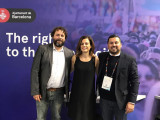
Amsterdam, New York en Barcelona hebben vandaag een coalitie gelanceerd om op te komen voor digitale rechten. De drie steden vinden het belangrijk dat inwoners online dezelfde rechten hebben als offline. De samenwerking is gepresenteerd tijdens het Smart City Expo World Congres in Barcelona op woensdag 14 november.
Digitale technologie maakt ons dagelijks leven makkelijker. Tegelijkertijd worden we ons meer bewust van de risico’s. Over de rechten die mensen digitaal hebben, zijn bijvoorbeeld geen duidelijke afspraken gemaakt. Daar willen Amsterdam, Barcelona en New York verandering in brengen. Zij willen opkomen voor mensenrechten op internet. Overheden kunnen meer doen om deze rechten te beschermen. Amsterdam neemt samen met Barcelona en New York het voortouw door een coalitie van steden voor digitale rechten op te richten.
De coalitie voor digitale rechten maakt gezamenlijk beleid, een actieplan en (hulp)middelen op basis van vijf gedeelde principes. De principes uit de verklaring van digitale rechten zijn:
1. Universele en gelijke toegang tot internet, digitale geletterdheid;
2. Privacy, data bescherming en veiligheid;
3. Transparantie, verantwoordelijkheid en niet-discriminatie;
4. Participatieve democratie, diversiteit en inclusie;
5. Open en ethische digitale standaarden.
De komende tijd sluiten meer steden zich aan om kennis uit te wisselen en digitale mensenrechten te beschermen. Het Human Settlements Program (UN Habitat) van de Verenigde Naties helpt hierbij.
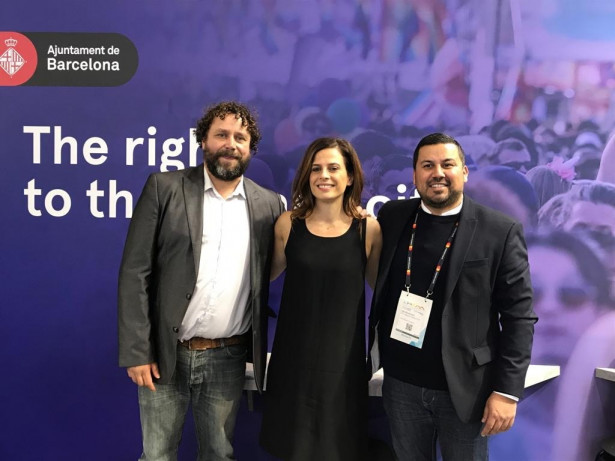
Foto: Ger Baron (CTO, Amsterdam), Francesca Bria (CTO, Barcelona), Alby Bocanegra (CTO, New York)
Nederland en de Smart City Expo
Het Smart City Expo World Congres is een jaarlijks terugkerend evenement waar steden en bedrijven van over de hele wereld samenkomen om stedelijke innovaties te bespreken. Er is veel aandacht voor digitale innovaties, welke steeds meer leidend zullen zijn in de steden van de toekomst. Amsterdam Smart City is aanwezig als onderdeel van de Nederlandse delegatie om het nationale en internationale netwerk te versterken, te leren van andere steden en zo innovaties beter in te kunnen zetten voor grootstedelijke uitdagingen.
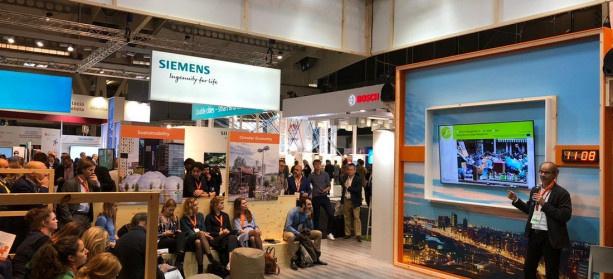 Duidelijk over data
Duidelijk over data
In de Metropoolregio Amsterdam wordt gestreefd naar een mensgerichte benadering van technologie. Zo is het manifest "Tada, duidelijk over data" –ontwikkeld met lokale bedrijven, academici en bewoners . Hierin is aandacht voor concepten als inclusie, transparantie en ethisch gebruik van informatie.
Voor meer informatie, bezoek citiesfordigitalrights.org.
FOR ENGLISH: Click here to see the press release by the city of Amsterdam <https://www.amsterdam.nl/en/press-releases/digital-rights/>
Introduction to the Holland Pavilion
A larger than ever Dutch delegation has come to Barcelona to exchange knowledge and meet business partners. At the Smart City Expo World Expo in Barcelona, other valuable contacts are just a few steps away!
We've organized ourselves so that the Dutch cities join together in at the Dutch pavilion. How did we do that? And which topics can be found there? Celine Prins, community coordinator for the Institute for Future of Living, gives an introduction to the Holland Pavilion at the Smart City World Expo.
Are you at the Expo too? Come visit us in hall 2, Street D, Stand 479!
Find more video's on Smartcity Update video channel: https://www.youtube.com/channel/UCjbq_13QmRm1Hhr1nQjSI1Q
See movies we made with participants in Amsterdam here: https://amsterdamsmartcity.com/posts?tags=smart-city-expo-2018
Amsterdam tests autonomous boats
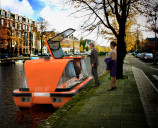
Small-scale autonomous boat prototypes have been tested in Amsterdam to evaluate their potential to relieve road congestion by ferrying commuters and collecting household waste along the city’s extensive canal network.
Click on the link to continue reading: https://cities-today.com/amsterdam-tests-autonomous-boats/
Find out more about the initiator, and partner of Amsterdam Smart City, Amsterdam Institute for Advanced Metropolitan Solutions here: https://amsterdamsmartcity.com/network/ams-institute
Stay up to date
Get notified about new updates, opportunities or events that match your interests.

